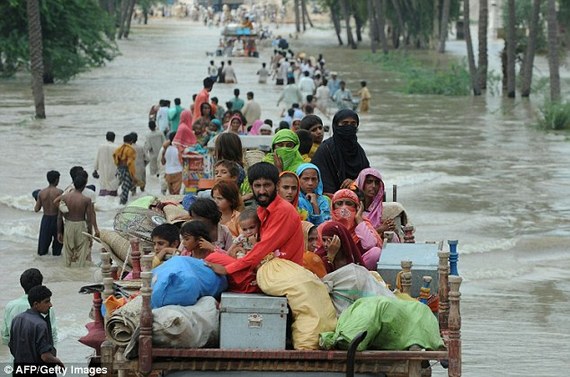President Obama's announcement of a new Environmental Initiative is sure to reignite the climate change debate in the United States. Although 97% of scientists agree that global warming is real and caused by human activity, a Pew Research Poll conducted last fall showed that just 61% of Americans believe that there is "sold evidence that earth has been warming." Breaking down those numbers further, 37% of Republicans and 79% of Democrats answered affirmatively to the question. Even fewer believed that global warming is a threat to the U.S., with just 48% of overall respondents recognizing the danger.
Why do nearly 40% of Americans (21% of Democrats and 63% of Republicans) still question the overwhelming scientific evidence behind global warming? Why do the majority of Americans fail to recognize the dangers? The media certainly has a major role to play in that the debate is often framed in a way that suggests science has not reached consensus. This is not only disingenuous, but also dangerous since public opinion is, at least, a partial driver of American policy. Because information on the scientific consensus and the potential dangers take a backseat to the alleged debate and cliche images of polar bears clinging to ice blocks, the public remains severely uninformed about the many potential dangers that require action. Here are three:
First, the stunningly rapid rate of ice cap melting is already resulting in the militarization of the Arctic. The United States, Canada, and Russia, in particular have begun a military buildup to lay territorial and seabed claims to the mineral rich Arctic Sea. These efforts have included an increase in the number of warships, nuclear-powered icebreakers, submarines, and expanded military and "sovereignty" exercises. Canada has even contemplated setting up a military base. The possibility of a conflagration increases with any unresolved territorial claim, especially one that will involve the extraction of highly lucrative minerals. No country will easily give up the undiscovered potential of 30% of the world's natural gas and 13% of its oil.
Second, the impacts of global warming are already being felt in the global south and will have serious ramifications for the United States. Water scarcity is already an issue in many developing nations, and global warming is already exacerbating the problem. Some scholars have suggested that shortages and disputes over claims to water will lead to an increase in wars - including the Palestinian-Israeli conflict. After the 1967 war, Israel occupied not only land, but also gained control of crucial waters of the West Bank and the Sea of Galilee. Given the "special relationship" between the United States and Israel, there is no question that water rights will become an increasingly sensitive issue that will force any American administration to pressure Israel to equalize water distribution or face the wrath of a population already frustrated by the U.S.'s pro-Israeli stance.
Third, rising sea levels put not only America's coastal cities at risk, but also far more densely populated areas across the globe. For instance, it is estimated that 13 million people will be forced from their coastal homes in a group of islands in the Bay of Bengal off India's coast. The Maldives and other small Pacific island nations are forecast to disappear in the next 50-100 years. And this is just in one small region of the world. These are not remote forecasts - it will happen in our, and in our children's' lifetimes. Rising sea levels will result in yet unseen waves of international migration that will put enormous pressure on governments and economies - not to mention the displaced themselves. It is unclear who will absorb the tens of millions of climate change refugees and how they will be integrated into new societies. Certainly the United States will face the problem both directly, through increased migration, as well as indirectly, through potential destabilization of countries such as India that will be forced to contend with major population shifts.
These are but three serious, imminent security threats. Rather than continuing the useless debate on the science behind global warming, we are much better served thinking about ways to reverse its course and mitigate its effects. Obama's initiative is a first, but still incomplete, step to tackling a truly global problem that will affect us all.
Advertisement

